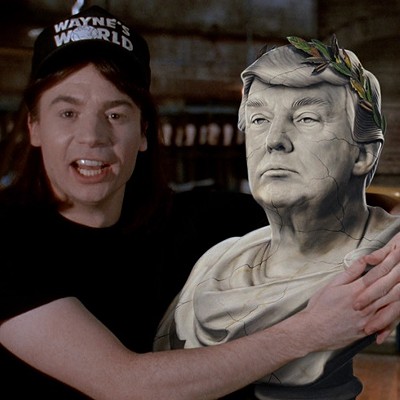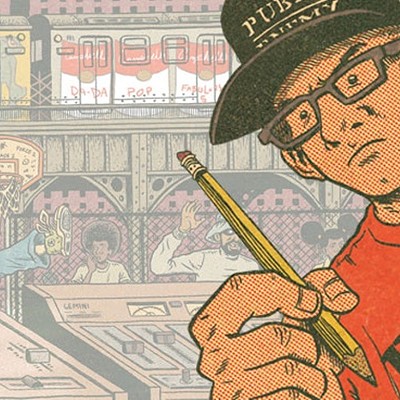Feel like a horror film? Something that'll make you gasp out loud, feel queasy and send you home from the theater shaken and wary? Forget whatever slasher flick is terrifying the kids out at the mall and make tracks for Alex Gibney's documentary Enron: The Smartest Guys in the Room. His journey into the heart of financial darkness that was the Houston-based energy company is riveting, mordantly funny and deeply alarming.
Gibney presents Enron's relatively short life story -- founded in 1985, America's seventh largest company imploded in the fall of 2001 -- in a straightforward manner. He relies on insider accounts, archival footage from news and Congressional hearings, the research of Fortune reporter Bethany McLean (who broke much of the Enron scandal in 2001) and, most damning, internal video and audio tapes.
It's not simply that Gibney outlines the familiar tale of a meteoric rise and fall. Through his skillful construction of seemingly banal artifacts -- a bit of corporate memo, a moment of TV news, a flicker from an internal training video -- elucidated by former Enron employees and industry players, he paints a broader picture of capitalism gone not just greedy, but rogue and even bonkers.
In Enron's most stunning strategy, the company, in 1992, with approval from the feds, adopted mark-to-market accounting, allowing it to log potential future profits before they occurred. If a project went bust -- or never even happened -- Enron's books still showed whatever profit it chose to essentially make up. Wall Street and the media went ga-ga over Enron's fantastic numbers. CEO Jeffrey Skilling was particularly adept at telling a story about Enron's success that everybody wanted to believe. Nobody questioned it (ironically, Enron's corporate slogan was "Ask why") and Enron's phony schemes ran unchecked. As one industry analyst later rued: "Perception was the new reality."
Enron deftly illustrates that it wasn't just the top execs like Skilling and chairman Ken Lay who were to blame. Enron bilked the system, the economic core of our country, and the system purposefully turned a blind eye. The level of complicity ranged from the White House to the man in the street riding the bull market. Gibney offers lucid cultural psychoanalysis for how the debacle happened: that it was a mutation of deeply held cultural values like winning, trust and innovation, and that, in some respects, we collectively let it happen.
Even as we cynically expect corporate executives to line their pockets at the expense of ethics -- and the Enron honchos walked away with millions -- the moral vacuum that gave rise to the company's last great money-maker is almost unfathomable. Enron traders, working from a plan nicknamed "Death Star," purposely rigged California's energy supply to create artificial shortages that allowed them to sell back the pilfered energy at wildly inflated costs. California's already ailing economy was crippled by a series of rolling blackouts. Businesses were forced to shut, food went bad and people were trapped in elevators while, several states away, Enron raked in money. Jubilant traders, caught on audiotape, cackled, "Let them use fucking candles."
It's shocking and enraging to discover ordinary people -- whom we might think of as boring business guys -- reveling in their knowledge that they weren't just making a better buck, but also explicitly hurting other ordinary people. By way of explanation, Gibney cites Stanley Milgram's infamous behavioral experiments in which participants, under mild orders, willingly subjected others to what they believed were dangerous, even fatal electric shocks. As Gibney argues that Enron traders were likewise complicit in a situation that rewarded even immoral behavior, he cuts from footage of those electric-shock experiments to news accounts of the chaos in West. It might be funny -- if it weren't true, if you could be sure such a thing could never happen again, and if some hyperbolic he-man hadn't ridden that fake energy-crisis train straight into the California governor's office.
It's hard to believe that a film filled primarily with talking heads detailing mystifying corporate accounting practices is so compelling, shocking and even harrowing, but Enron is must-see material. Gibney's film concisely compiles the true horror of what happened, turning a complex financial story into a profound drama with catastrophic human costs. House of Enron is a hundred times scarier than House of Wax. 













